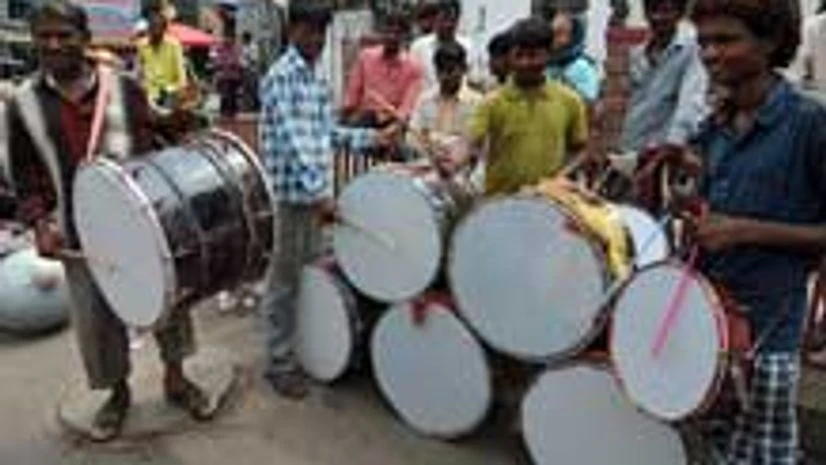It's the final immersion day of the Ganeshotsav and the merciless afternoon sun beats down on the city. A few men are seated on the footpath opposite Masunda lake in Thane, with giant drum kits laid out neatly by their side. They are being approached by customers who are on a lookout for a few hours of reverberating music. These musicians are part of the several dhol-tasha troupes that travel to Mumbai each year from small towns across Maharashtra for the 11-day long festival.
Most of these musicians hail from parts of Solapur, Kolhapur, Kopargaon, Shirdi and even Indore. For the duration of the festival, they camp on sidewalks or open grounds in Mumbai, often sharing space with drunkards. The chance to play in a big city motivates them to take these challenges in their stride. "It is very tough work, but at the same time it also feels like a vacation," says Arun Waghmare, who has come from Shrirampur in Shirdi.
Instead of bustling localities such as Dadar and Juhu, these musicians prefer playing in central suburbs like Thane, Mulund, Kalyan, Dombivli and Ulhasnagar. Cops here don't push them around, and local shopkeepers are hospitable, offering water and assistance to store the instruments. "Bigger areas are chaotic and you have to compete a lot. These parts of the town are more familiar," says Narayan Bodole, who leads the Matrubhoomi Dhol Tashe Mandal from Bhusawal in Jalgaon.
Also Read
Veterans like Hemant Sabale of Baramati first came to Mumbai during Ganeshotsav about 20 years ago. With his efforts proving lucrative, more people followed Sabale's example and started coming to the city in groups of 7 to 10. For some of them, playing the dhol is part of an ancestral tradition, and they learned to play by the ear. They train for about 10 days before the festival, practising styles ranging from 'Nasik' and 'Pune dhol' to 'Garba' and 'Kashmiri'.
The drummers cannot afford matching clothes but have managed to cloak the dhols in bright banners displaying the troupe's name. Their services are sought by families on immersion days. While people bid goodbye to Ganesha, the musicians follow them, beating the drums and tasha (kettle drum) non-stop. The sessions often leave them dripping with sweat and with blisters on their fingers. Played for as many as six hours at a stretch at times, the hammering sound may seem like cacophony to unwitting listeners, but in a procession it is known to make feet tap.
Bhusawal's Bodole, like several dhol-tasha musicians, plays in a wedding band for the rest of the year. His troupe members have odd jobs in small-scale industries like scrap, rope-making or broom manufacturing. Some are farmers and drivers. "Steady jobs are hard to come by in our town," says Waghmare. So, youngsters like Gajanan Pirade, who has studied till the 12th standard, also try stints in dhol-tasha groups.
Costs have been climbing. For travel and food, a troupe spends about Rs 250 a day on each member. The rent for a stay in a hotel or lodge was never within reach for them. Conversely, returns have reduced over the years. The price quoted starts at Rs 5,000 for an hour, but orders close at Rs 3,000. At the end of the festive season, each troupe member takes back Rs 2,500 to Rs 4,000, enough to make ends meet for two months.
As more and more revellers choose to rope in DJs for their celebrations, competition has grown and demand has declined. "But a DJ is just one man with a machine," says Sabale. "Our music does not need wires. It takes skill and the money we get feeds 10 members of the troupe."

)
